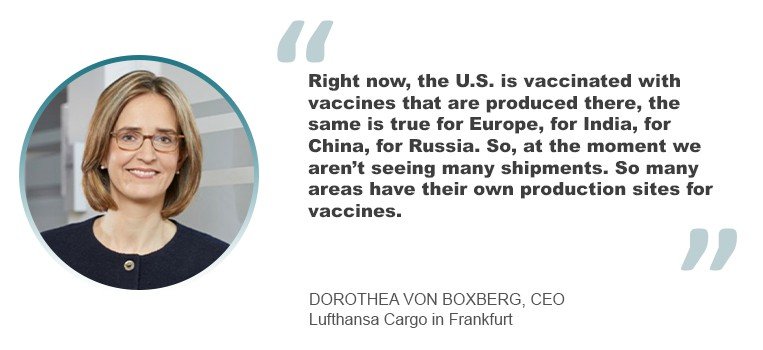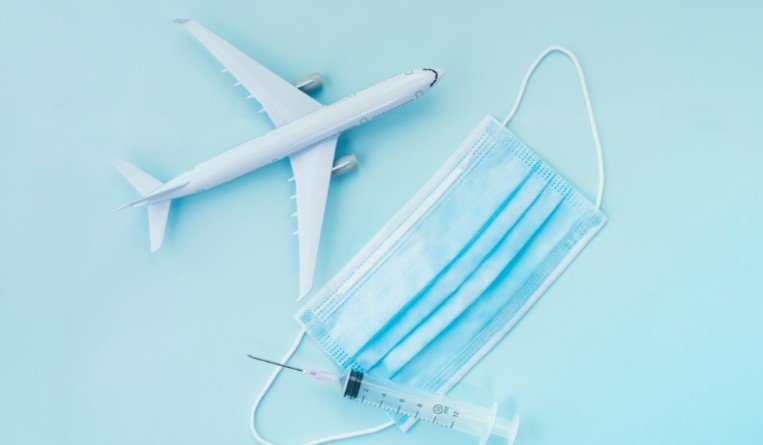Airlines are not expecting volumes in the transport of Covid-19 vaccines to have as much impact on the air cargo market as initially anticipated, with some industry leaders noting that carriers are moving highly-sensitive goods more for humanitarian reasons.
Lufthansa Cargo CEO Dorothea von Boxberg said around 45% of total vaccine volumes will be transported by air, fewer than previously expected, as outlined in findings from Accenture Strategy and Consulting. Vaccines are also produced regionally and could be moved through overland transport and not air.
“Right now, the U.S. is vaccinated with vaccines that are produced there, the same is true for Europe, for India, for China, for Russia. So at the moment we aren’t seeing many shipments,” the Frankfurt-based von Boxberg told a news conference earlier this year. “So many areas have their own production sites for vaccines.”
Vaccine shipments “not game changer” for industry
In general, Lufthansa Cargo is expecting that around 87,000 tonnes of coronavirus vaccines will be transported by air, and the carrier itself to handle “less than 10,000 tonnes,” according to the Lufthansa executive.
“It will be significant, it will be noticeable, but it won’t congest all the aircraft. As a comparison, in 2019 we transported almost 100,000 tonnes of cold chain/pharma shipments,” von Boxberg said as the carrier also announced its financial results for 2020.
“That extra 10,000 is good to have and we are glad to help but it is not a major game changer for our industry,” she added.
Separately, Julia Leukel, a spokesperson for Lufthansa Cargo, said the cargo carrier is expecting volumes to pick up in the second and third quarter of the year as more vaccines are exported out of Europe.
“We assume that the peak in demand still lies ahead. We are expecting a significant increase in the second and third quarter of 2021,” Leukel told Asia Cargo News.
“In the first quarter, the available vaccines were mostly trucked throughout Europe (when produced in Europe) and mainly transported by local carriers when produced on other continents. In mid-term, Europe will be a net exporter of Covid-19 vaccines,” she added, noting that Lufthansa Cargo’s “most important business will be the intercontinental business.”
“The trade lanes between Europe and Asia and Europe and the North Atlantic are particularly strong,” Leukel said.
Nonetheless, the freight arm of the German carrier is looking to book another strong year for pharma in 2021 as worldwide demand for various healthcare-related shipments remains.
“Pharma is generally a strong growth market for airfreight. Pharma contributed significantly to last years’ results and we expect it to be similar in 2021,” Leukel said, adding that “Lufthansa Cargo has an over proportional market share.”
“We are ready to make another important contribution to overcoming the pandemic by distributing the vaccines worldwide. [In] 2019 we had almost 100,000 tonnes of pharma shipments. In 2020, Germany ranked 3rd in the worldwide comparison of export markets for pharmaceuticals with 43,000 tons of shipments,” she added.
Demand for Covid-19 vaccine shipments to continue
US-based United Cargo also expects demand for vaccine shipment to persist throughout the year as the carrier committed to continue flying these temperature-sensitive vials worldwide.
“We have transported approximately 10 million doses of vaccines all over the world,” Jan Krems, president of United Cargo told Asia Cargo News.
He noted that last year, the carrier also flew over 113 million pounds of medical/pharma-related cargo.
“With every vaccine authorization, we expect there to be an uptick in demand. While the demand for vaccines continues to be top of mind, we expect to continue flying these shipments,” Krems added.
In general, United – which was the commercial airline which delivered the first batch of Pfizer and BioNTech’s Covid-19 vaccine to the U.S. – said air freight will continue to be in demand this year as capacity remains tight.
“We expect cargo to remain in high demand, mainly driven by less capacity in the market,” the United Cargo chief said.
Meanwhile, Korean Air said passenger aircraft belly cargo capacity in general is “unlikely to recover” to pre-pandemic levels in the short term and the capacity shortage in the global shipping industry will also push demand for air freight.
“It seems that the situation in the first quarter of this year will remain for some time,” a Korean Air spokesperson told Asia Cargo News.
In terms of vaccine transport, it noted that aside from the vaccine itself, the carrier has also been shipping ingredients for the shots – manufactured in South Korea – to both Europe and Japan since December.
As Korean Air committed to continue transporting similar shipments between Asia and Europe, it noted that “vaccine shipments are minor” compared to its total freight volumes.
“Korean Air is prioritizing the transport of Covid-19 vaccines regardless of capacity or performance,” the spokesperson said. “We are transporting Covid-19 vaccines and medical supplies to contribute to humanitarian and pandemic relief. Transporting Covid-19 vaccines is our first priority, regardless of its operational impact.”
In September last year, the International Air Transport Association (IATA) predicted that the global vaccine distribution would be “the mission of the century” for the air cargo industry requiring 8,000 Boeing 747s for the world’s population to get a single dose of the vaccine.
Meanwhile, Lufthansa Cargo, United, and Korean Air earlier joined a major initiative by the United Nations International Children's Emergency Fund (UNICEF) to prioritize delivery of the Covid-19 vaccines, essential medicines and other critical supplies to respond to the pandemic through its Humanitarian Airfreight Initiative.
More than 10 leading airlines will be supporting the UN agency’s roll-out of vaccines to ensure equitable access to Covid-19 vaccines worldwide.




